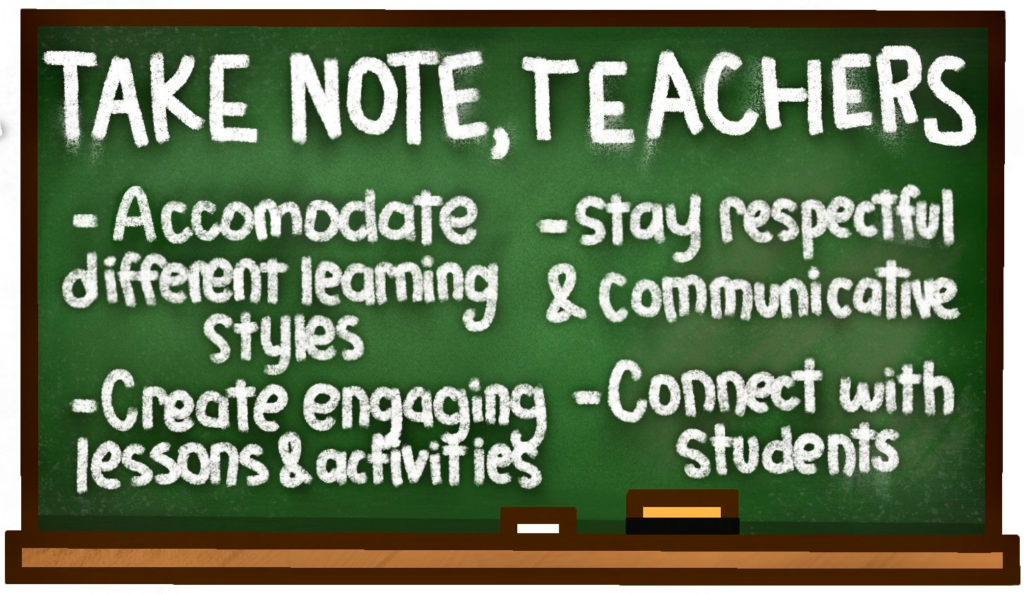
By Lucas de Paula
Editor-in-Chief
Students spend a substantial portion of their lives in classrooms. Teachers have the power to change lives; opening floodgates of knowledge and creativity, and breaking boundaries of what students can achieve. Although adequate teachers aren’t headline-worthy news, there is no room for mediocrity in education. Students deserve the best.
Ineffective teachers are boring and don’t engage students, even when their content is in-depth and useful. Teenagers and kindergarteners have the same attention span, except most teens sit still.
When an instructor spends the entirety of class reading content off a PowerPoint that can be found in a textbook, students disengage. Teachers need to ask themselves: is what they’re doing for the students’ beneficial, or just to maintain the status quo?
One teacher who goes above and beyond, is entertaining as a teacher and academically rigorous is Government and Microeconomics teacher Robyn Selders. Her classes are a medley of note-taking days, classwork, group activities and live demonstrations. She often changes the projectile of her curriculum based on how comfortable the students feel with the material. Selders allows students to turn in work no matter how late, for full credit, which prioritizes learning over punishment. She recognizes students are imperfect and doesn’t hold them to an inhumane standard, yet is still an A+ teacher. I feel genuinely motivated to engage with her.
Another critical issue with some teachers is that they deliver a consistent approach to every student, or they lump students into a cookie-cutter definition of what success looks like.
Instructors should take an individual and humanistic approach, celebrating students on their journey and only comparing them to their progress. The quickest way to lose a student’s attention is to treat them like another filled seat.
Mihee Kim is a beautiful example of someone who truly gets to interact with students on a personal and authentic level, recognizing the individuality of all and elevating their differences. Meanwhile, some teachers expect everyone to stay still, be quiet and take notes five days a week, 10 months straight. In Mrs. Kim’s art class, she encourages students to approach obstacles with unique perspectives, which furthers their creativity and passion for the subject.
The very act of overcoming obstacles in innovative ways reinforces the commitment students have, which builds learning. Instead of math teachers teaching a singular way of solving a problem, why not celebrate reaching the same answer via different techniques? More effort is put into classes when students emotionally connect to the teacher, no matter the subject.
I want to stress that not every teacher is inadequate, or that every kid is a perfect scholar. By educating future generations, teachers have the most important job. Using outdated lecture techniques isn’t going to work, this isn’t a job you clock in and out of.
As students, it’s our foremost responsibility to be in charge of our own education, no matter the circumstance. You cannot blame educators for not teaching you something, because ultimately it’s your responsibility to learn. With that said, there are ways to approach your teachers to help inspire change for a better learning environment.
The most frustrating thing is trying to find passion for studying a subject when the teacher doesn’t infuse their passion into their curriculum. Students deserve to learn the real-world implications of what they’re taught, instead of studying what will be on the test.
Students can start taking responsibility in their education by attending office hours to address, instead of waiting for a teacher to notice them struggling. During this period, students should be able to communicate what teaching style works best for them, or air any concerns. Instead of reporting teachers immediately to administration, try chatting with them first.
In light of teacher shortages, many are quick to tally their imperfections. We forget that teachers have bad days, and come home exhausted after a long day of dealing with rowdy adolescents. But teachers carry the immense weight of their job alone; to test, grade, educate and inspire. It’s on them to support their students and recognize the light in every soul and nourish it.
No student is dumb, they only lack support. No teacher is bad, only misguided. Let’s work together to recognize our weaknesses, but more importantly, to work around them and create a more communicative, driven and empathetic future.
